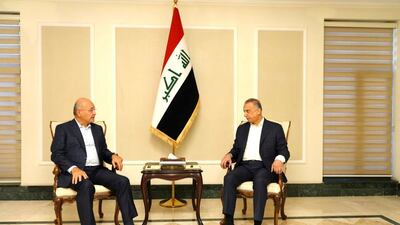Iraq will form a “capable” government that will cater to the public’s needs, top officials said, as back room negotiations kicked off this week to establish a new cabinet.
Iraqis went to the polls on October 10 to cast their votes for a new government in an early election that was demanded by anti-government protesters two years ago.
“The new year will witness the formation of a new government that will be capable to safeguard its people and neighbours,” President Barham Salih said late on Saturday.
“A new year is upon us, carrying with it the aspirations of our public who have faced hardships and adversities,” Mr Salih said.
On Friday the Iraqi leader said in a decree that the newly-elected parliament will convene on January 9.
Iraqi members of parliament will elect a parliamentary speaker and two deputies in their first session. They will later choose a president, who will ask a nominee from the largest parliamentary bloc to form a government and serve as prime minister.
Mustafa Al Kadhimi, the current prime minister, said on Saturday that his government has “succeeded in improving the country’s foreign relations” and returning “Iraq’s role in the international community.”
“A year has passed, sweetly and bitterly, during which we presented the white paper for economic reform, which was well received by many national and international sectors, and it is a plan of action for the next five years,” Mr Al Kadhimi said, referring to the economic crisis the country has endured.
The Iraqi leader urged the public to unite to ensure that 2022 will be a year for “investment, development, eliminating corruption and reconstruction purposes.”
“The ambition of Iraqis has no limits,” he said.
Last Monday, the country's top court rejected a challenge to the results of the elections filed by Iran-backed factions.
The Federal Supreme Court upheld the final results announced by the Independent High Electoral Commission on November 30 after recounts in several constituencies.
Populist cleric Moqtada Al Sadr was the biggest winner on October 10, securing 73 seats in parliament, while Iran-linked groups, along with a number of well established parties, suffered sharp declines in support.


